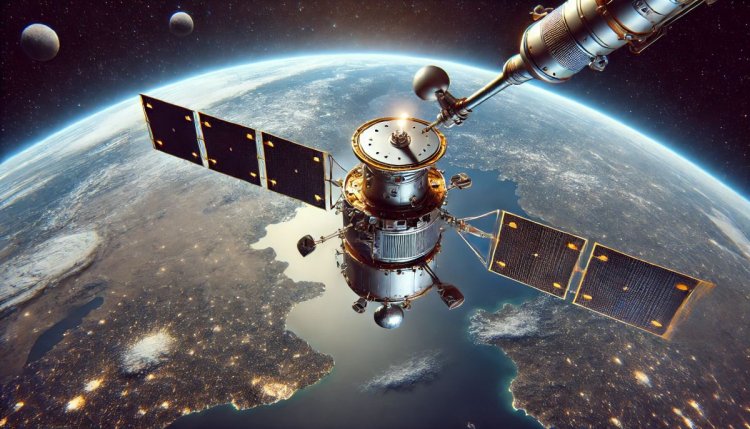Are we ready for a new scientific revolution?
In 2025, robots can handle various tasks. Unprecedented successes can be achieved by turning digital ideas into reality. However, there are no less challenges in this path of scientific progress. The first question is whether we are really ready for this scientific revolution?

In the blink of an eye, the world seems to be moving ahead in an era of amazing scientific and technological advancements. We have AI-powered assistants like ChatGPT, which instantly answer our questions on cue, and can even make our everyday tasks easier. The mRNA vaccine has brought about a huge transformation in the healthcare sector by making possible quick and effective solutions to diseases. While on the one hand, we are exploring the mysteries of the vast universe with the help of the James Webb Space Telescope, on the other hand, modern technologies like quantum computing have emerged as a hope for breakthroughs in fields like medicine and climate change.
CRISPR While CRISPR gene editing tools have opened up the door to treating genetic diseases, innovations like artificial photosynthesis are leading us towards clean energy sources. Amidst these global changes, with collective initiatives, visionary policies and strong collaboration between academic institutions, industries and the government, India is not only moving ahead at a fast pace by promoting innovation, but is also playing the role of a leader.
Also read: ChatGPT now has voice and picture capabilities; here's how to use these features.
India's Bio E3 policy is paving the way for a 'life sciences industry' by transforming the biotechnology sector through advanced facilities like Bio-AI Hub, Bio Foundry and Biomanufacturing Hub, enabling the production of medicines, biofuels, climate-friendly crops and products like bioplastics and bio-cement.
A great example of India's progress in science and technology is the space program, which is attracting the attention of the world. The successful Chandrayaan-3 mission has strengthened India's position in lunar exploration and the ambitious Gaganyaan project aims to send Indian astronauts into space, thereby making space travel a reality.
A new generation of scientists and engineers will be inspired. Apart from this, while ISRO's satellite launches have brought a revolution in communication, weather forecasting and agricultural schemes, on the other hand, private companies are also keeping pace with the government in the field of innovation. This is not only making space technology easily accessible, but also boosting India's space economy.
The National Quantum Mission (NQM) focused on quantum computing, communications, sensing and materials is another transformational initiative. Its practical benefits include accelerating drug discovery, securing online transactions, enabling ultra-secure military communications and improving energy efficiency. India's Deep Ocean Mission is also in the news because of the deep-sea capable vehicle 'Matsya 6000'. This state-of-the-art vehicle is capable of descending thousands of meters into the sea to explore the mysteries of the deep sea, discover new marine species and extract valuable resources. It also strengthens the blue economy while responsibly exploiting marine wealth, creating jobs and ensuring sustainable development.
Also read: OpenAI GPT-4o: We will know what OpenAI said about its new model GPT-40.
India's National Green Hydrogen Mission is paving the way for a clean energy future, envisioning cars and industries running on pollution-free hydrogen fuel. Amidst all this, the Defence Research and Development Organisation (DRDO) is bringing about a sea change in missile technology by innovating in hypersonics as well as avionics.
Not only is India collaborating with academia and industry to enhance its technological prowess, it is also increasing the participation of young researchers in the field and promoting a culture of innovation. Talking about India's startup scene, it is full of creativity and energy and is a hub of innovation, which is being promoted by young entrepreneurs and government policies. Apart from this, India is actively collaborating with other countries like the EU, UK, US and BRICS to solve global challenges like climate change and health problems.
The changes taking place in scientific progress are now focused on creating materials and biological products designed for specific needs, rather than just discovering or implementing new things. These are being operated by AI and robots. In the future, robots can take over the tasks performed in laboratories and unprecedented breakthroughs can be achieved by turning digital ideas into reality through cloud-based laboratories. However, there are no less challenges in this path of scientific progress. The first question is whether we are really ready for this new scientific revolution? Because our scientists neither have adequate resources nor state-of-the-art facilities for complex tasks. Apart from this, lack of talent in emerging technologies is also a problem.
Also read: Is AI dangerous? Former ChatGPT employee reveals flaws in open letter
Therefore, we must first invest more in scientific infrastructure to ensure that the workforce has the right skills to meet the demands of new and emerging technologies. Strengthening indigenous technologies is vital to reduce dependence on foreign patents and make the country technologically self-reliant. This is possible only when India's institutions focus on problem solving rather than just technology. The scientific community working towards national goals can translate these investments into impressive results. These collective efforts will strengthen India's position globally by making progress in key technologies such as generative AI, Internet of Things (IoT), 5G, blockchain technology, augmented and virtual reality, quantum computing, neuromorphic computing, cybersecurity, robotic automation, autonomous vehicles, digital twins and synthetic media.













